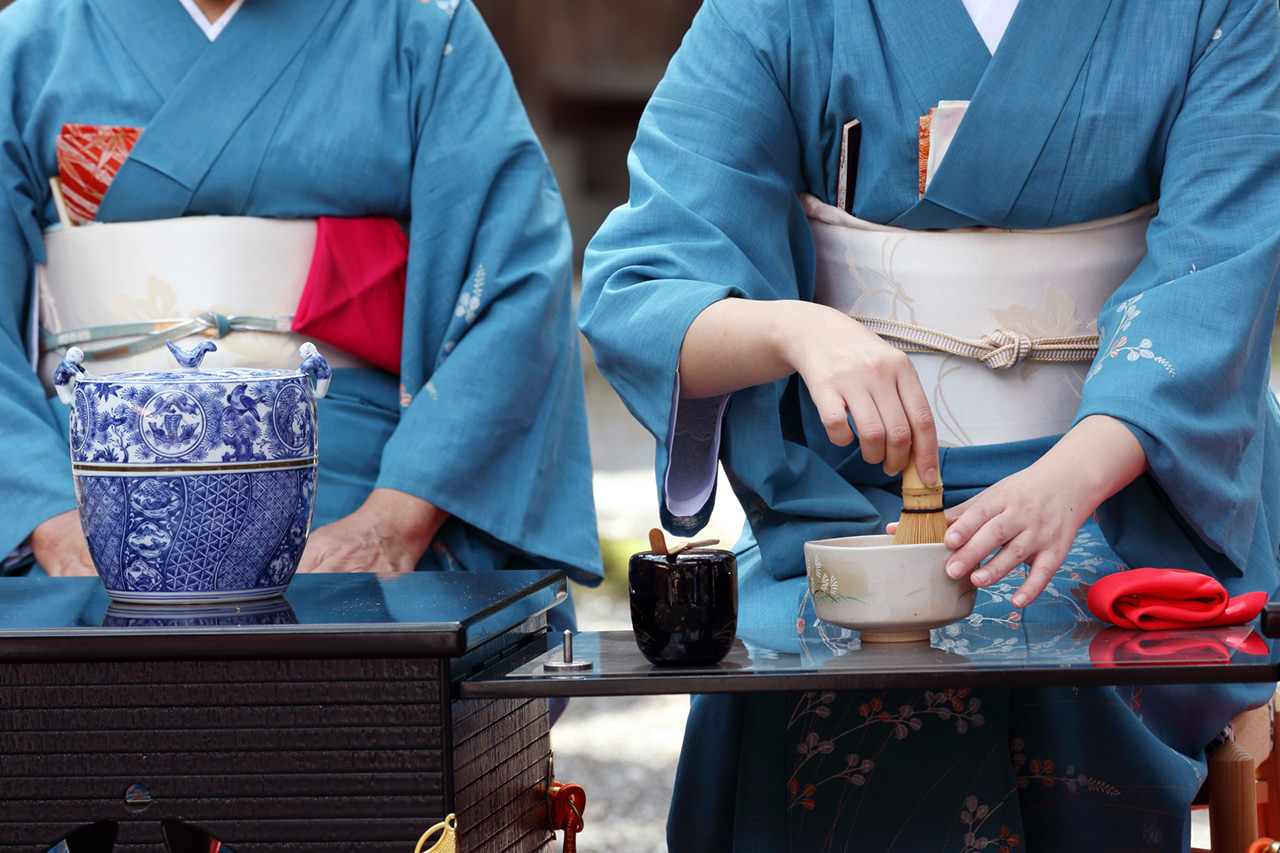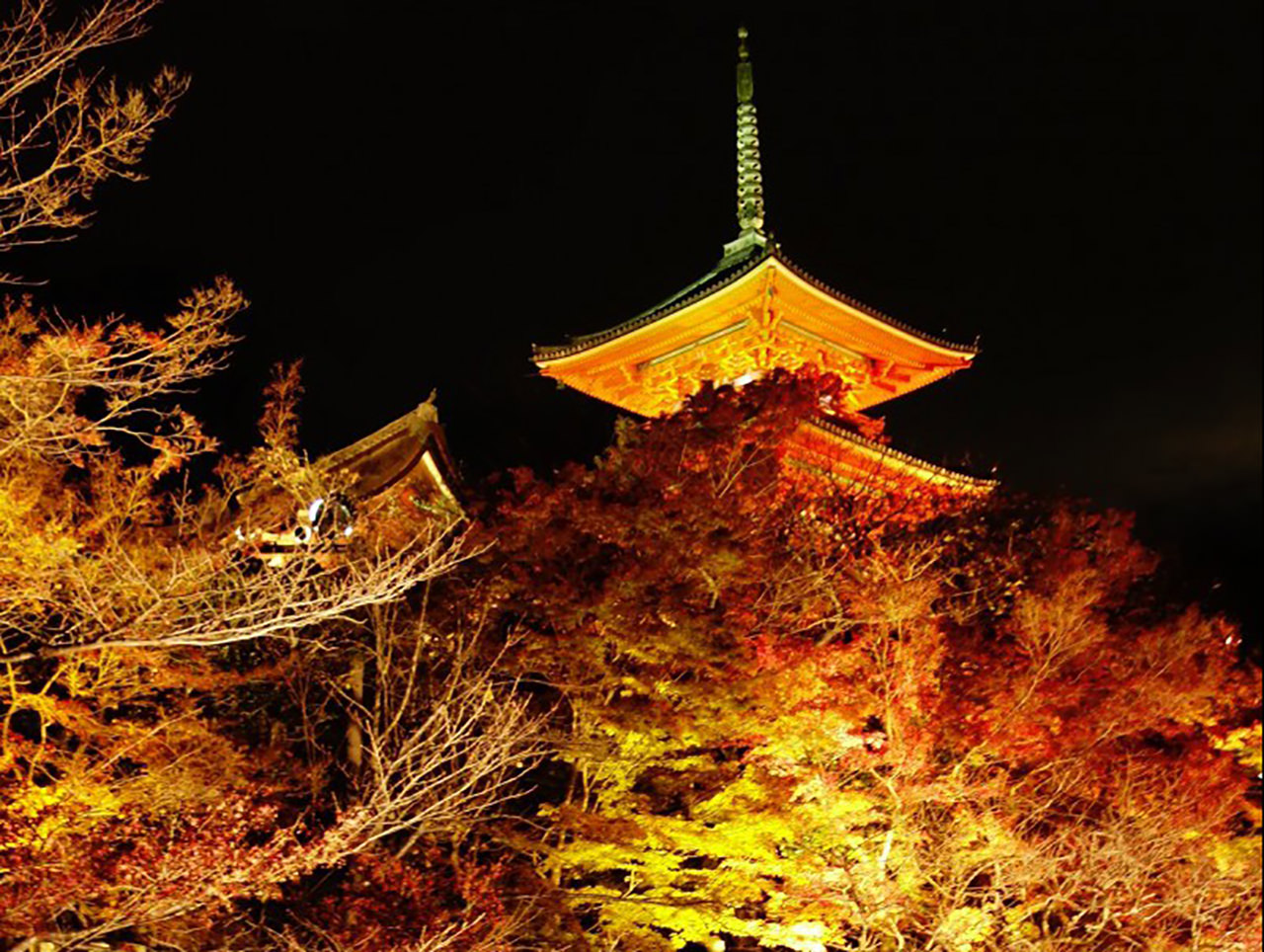Kyoto Through Novels: An Interview with Tomihiko Morimi
2022.10.12
Walking along the scenes of the novels with Mr. Morimi
In this interview, we started our journey on Kyoto’s Eizan Train Demachiyanagi Station with Mr. Morimi. We visited scenes that appear in the novels The Tatami Galaxy, The Night is Short and Walk on Girl, and The Eccentric Family such as Kamo Ohashi Bridge, The Kamo River Delta, Shimogamo Shrine’s Tadasu Forest and the Hyakumanben Crossroads. Then we entered a coffee shop called Shinshindo Kyoto University North Gate where we had a nice chat with the author.
In addition to myself, Ms. Wang Xuan and Ms. Shi Ruo-ying, international students attending graduate schools in Kyoto, also participated in the interview, and the three of us asked Mr. Morimi various questions. Everyone, of course, is a fan of Mr. Morimi’s work, so all of us were very excited to have this opportunity. It’s not often in life that you get the chance to sit down and talk with your favorite author.

At the Kamo River Delta, we all drank Ramune. You might be thinking, why is ramune coming up all of a sudden? For those of you who thought that the answer is in Mr. Morimi’s latest book, The Tatami Time Machine Blues, you’re right – ramune is a symbolic item in the story.
Out of all the places I visited this time, Shimogamo Shrine was my favorite, because I like the calm feeling of the shrine.
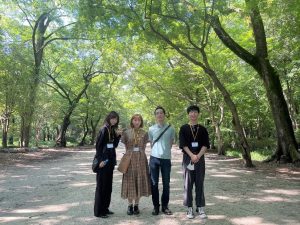
Interview with Mr. Morimi
During the interview, we asked him many questions about his work and his writing activities. The interview is a little bit long, but please read it all the way to the end.
The coffee shop where we had the interview is called Shinshindo Kyoto University North Gate and it was used for a very important scene in The Night Is Short, Walk on Girl. What’s more, I was able to sit in the exact same seat as the character in the novel while talking to Mr. Morimi! (Photography in the store is done with special permission.)
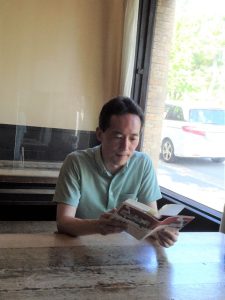
――Q: When writing a novel, do you have a fixed way of proceeding with it, such as deciding on certain parts (e.g character traits, title etc.) first before starting the novel?
I’m the type of person who doesn’t have a fixed way of doing things because if I plan out everything precisely from the beginning, it actually makes the writing process harder for me. Even though there are things that I planned out thoroughly before writing them down, there were also times when I wrote completely spontaneously. For each work, even the starting point is different. For example, in The Eccentric Family, I started with writing the personalities of the main and supporting characters, and then I built the story from there.
However, in the case of The Night Is Short, Walk On Girl, the first thing that came to my mind was the title. I was inspired by the lyrics of a Japanese song called “The Gondola Song” (Gondola no Uta), which goes as follows:
“Life is brief; Fall in love, maidens” (Inochi mijikashi; Koi seyo otome) – The Gondola Song
I thought about this opening line, and I asked myself the question “Where would people walk on a brief night in Kyoto?” and then I thought “It would probably be Pontocho”.
Really, my way of writing a story is different with each novel, and I’m still searching for new ways of writing all the time. At the time of my debut, I thought that in 20 years I would be able to write one story after another without worrying too much about it, but that was not the case.
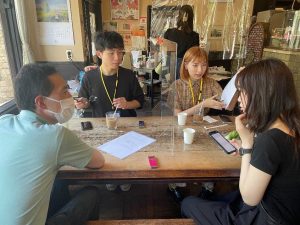
――Q: How do you overcome writer’s block?
When I get writer’s block, I usually read various books, go out, and just do normal things. Unfortunately, there is no magic spell that helps you overcome this. Whenever I’m unable to write, I tend to feel depressed, but then my wife comforts me by saying, that I’ll be able to write tomorrow.
Lately, I haven’t been forcing myself to write and I just tell myself that “I’ll be able to write tomorrow” like my wife does. Every day, I sit down at my desk and write something, but even if I can’t write much, instead of feeling down, I try to think that “I’ll do my best tomorrow.”
My goal is to increase the number of days when I feel like I did a great job, and I wrote a lot and reduce the number of days when I feel like I couldn’t write much.
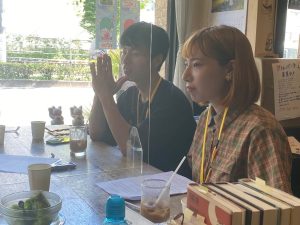
――Q: Many of your novels feature university students, but do you still interact with them or research the lives of current university students?
I don’t have any chance to actually interact with university students, so I don’t know much about their current situation. I don’t really write about the life of today’s university students, so I think The Tatami Time Machine Blues, which is a recent publication, might be different from today’s university students’ experiences.
――Q: I feel like there are many things that we, university students can relate to in your novels.
I’m glad to hear that.
The university students I’ve been writing about since my debut have a rather old-fashioned image. Or maybe you could even call them “delusional.” In my opinion, even if their stories don’t depict the reality of modern students, the difference is not that noticeable.
Of course, in order to depict students in a novel, there are people who listen to real life stories from current students and write about those experiences. But in my case, I prefer to portray fictional characters that I come up with. Because of this, there can be characters in my novels that people can’t relate to. Instead of conveying something in a realistic way, I am expressing what’s inside me.
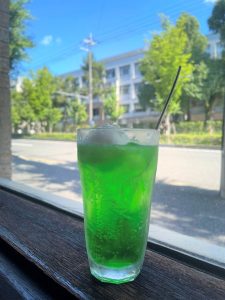
――Q: There have been many anime adaptations, so I think many people know about your novels from through anime. What do you think about that?
There are quite a lot of people who know about my work through anime. I really appreciate it when people watching anime find it interesting enough to even pick up an original copy of the book and read it.
I have a question for international students: when you read my book, do you read the translated version? I don’t speak other languages myself, so I wonder if everyone will have the same impression of my stories from the translated versions. The sound, flow, and rhythm of the Japanese language that I use is part of the story, so I wondered if it was possible to convey that atmosphere in the translated version.
――Q: I read your works both in Japanese and in translation, and I also watched the anime with subtitles. I think it’s interesting to read the Japanese version, because of the unique expressions, however the animation is easier to understand thanks to the visualizations. Mr. Morimi, could you please tell us what the difference between the original novels and the anime is?
There are a lot of anime adaptations, but the atmosphere in them changes depending on the director. This can be because of the director’s personality, style of arrangement, intensity, and so on.
However, if you look at it from the author’s point of view, the viewer may think, “Yeah, that’s how it’s supposed to look,” even though it is different from the original novel’s world view. Authors can be picky since their works contain their own views on the world.
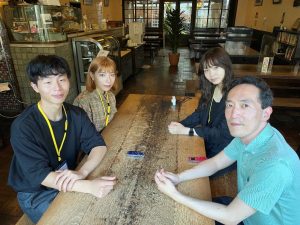
――Q: This is the last question. In your latest work The Tatami Time Machine Blues, you can use a time machine to go back to the past. If you were able to use a time machine, where would you like to return in time?
I would like to go back to my elementary school days (1980s). It was around the time of Japan’s bubble economy, and the atmosphere was completely different from today. I want to go back in time to see and feel what society and towns were like back then. I only remember small fragments from a child’s perspective, so I wonder what it was like beyond that.
――Thank you very much, Morimi-san!
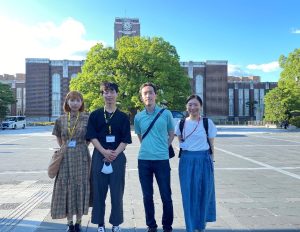
Lastly
In this interview with Mr. Morimi, I was able to hear about his work, while making new discoveries and learning about various ways of thinking. Thank you very much, Mr. Morimi! We are looking forward to your future activities and new novels!
Mr. Morimi told us, “In the story, I am writing about my own ‘Kyoto,’ which may be different from the actual Kyoto.” The way I experience Kyoto might also be different from what other people feel. And all of us might be correct at the same time. I can’t write a novel set in my own Kyoto, but I am doing my best to experience things that can only be done in Kyoto so that I can look back on my exchange student years without regrets.
(Text: Lee Hung-en, Doshisha University)
<Biography of Tomihiko Morimi>
Born in Nara Prefecture in 1979, he graduated from the Faculty of Agriculture, Kyoto University, and completed a master’s program at the same graduate school. In 2003, he made his debut with Tower of the Sun, which won the Japan Fantasy Novel Grand Prize. In 2007, he won the Yamamoto Shugoro Award for The Night Is Short, Walk on Girl, and in 2010, the Japan Science Fiction Grand Prize for Penguin Highway. Other works include The Tatami Galaxy, The Eccentric Family, and Tropics.








